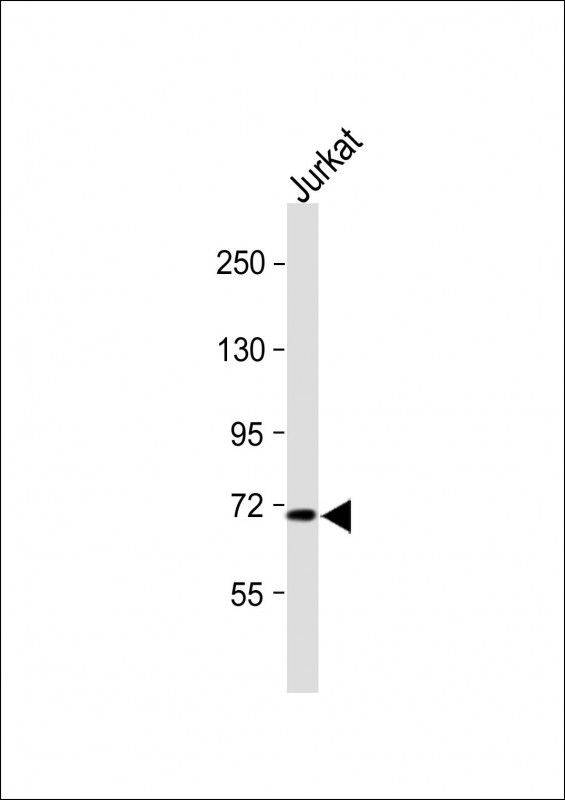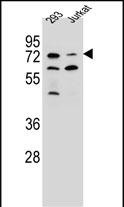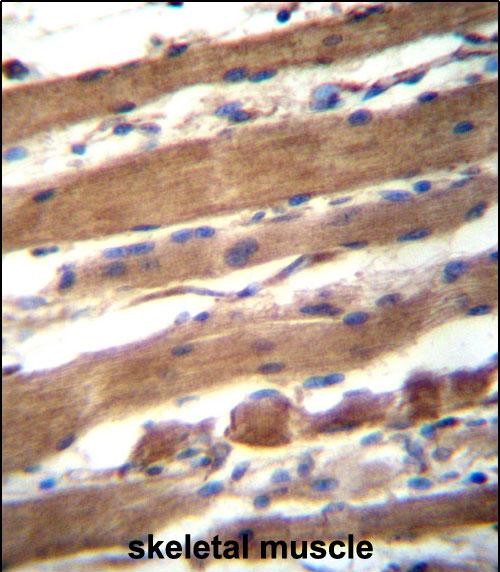


| WB | 咨询技术 | Human,Mouse,Rat |
| IF | 咨询技术 | Human,Mouse,Rat |
| IHC | 1/100-1/500 | Human,Mouse,Rat |
| ICC | 技术咨询 | Human,Mouse,Rat |
| FCM | 咨询技术 | Human,Mouse,Rat |
| Elisa | 咨询技术 | Human,Mouse,Rat |
| Aliases | Sodium/hydrogen exchanger 6, Na(+)/H(+) exchanger 6, NHE-6, Solute carrier family 9 member 6, SLC9A6, KIAA0267, NHE6 |
| Entrez GeneID | 10479 |
| WB Predicted band size | 74.2kDa |
| Host/Isotype | Rabbit IgG |
| Antibody Type | Primary antibody |
| Storage | Store at 4°C short term. Aliquot and store at -20°C long term. Avoid freeze/thaw cycles. |
| Species Reactivity | Human, Mouse, Rat |
| Immunogen | This SLC9A6 antibody is generated from rabbits immunized with a KLH conjugated synthetic peptide between 501-530 amino acids from the C-terminal region of human SLC9A6. |
| Formulation | Purified antibody in PBS with 0.05% sodium azide. |
+ +
以下是关于SLC9A6抗体的3篇参考文献示例(内容为模拟,实际引用请核实):
---
1. **文献名称**:*SLC9A6 mutations cause X-linked mental retardation, epilepsy, and cerebellar atrophy*
**作者**:Gilfillan et al. (2008)
**摘要概括**:研究通过免疫印迹(Western blot)和免疫荧光技术,分析了Christianson综合征患者中SLC9A6蛋白的表达,发现基因突变导致蛋白表达显著减少,提示其在神经发育中的关键作用。
2. **文献名称**:*Aberrant SLC9A6 localization in cerebellar Purkinje cells linked to neurodevelopmental deficits*
**作者**:Strømme et al. (2011)
**摘要概括**:利用SLC9A6特异性抗体进行免疫组织化学分析,发现SLC9A6在小脑浦肯野细胞中异常定位,可能与患者运动协调障碍及智力缺陷相关。
3. **文献名称**:*SLC9A6 regulates endosomal pH and trafficking in neuronal cells*
**作者**:Prasad & Wang (2015)
**摘要概括**:通过免疫细胞化学和流式细胞术,研究SLC9A6抗体标记的蛋白在神经元内体的分布,揭示其通过调控pH影响细胞内吞途径的功能机制。
---
注:以上文献信息为示例性质,实际研究需通过学术数据库(如PubMed)以关键词"SLC9A6 antibody"检索并核实。
×